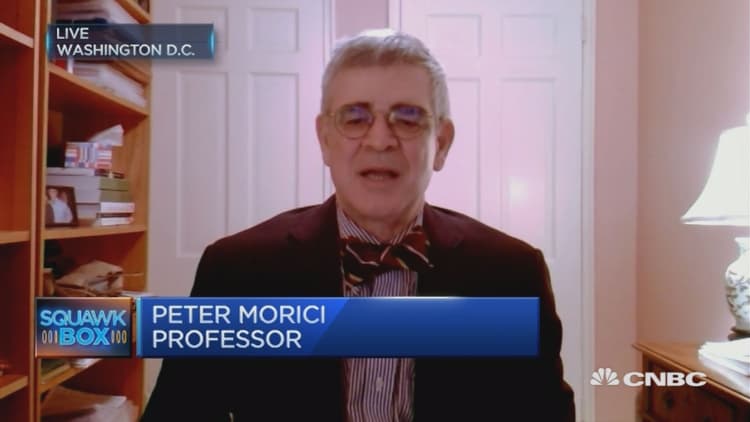President Trump's proposed budget may not make it through Congress, but his effort to slash funding for the National Institutes of Health is nonetheless having an impact on biotechnology start-ups and research.
Just ask Jonathan Hirsch.
Hirsch, the founder and president of medical software start-up
That all changed last week.
"The program is put on hold," said Hirsch, who added that he hasn't received word on whether it will eventually go forward. He's hopeful the funds will be available when the NIH gains clarity around its budget.
In March, Trump put forward his budget proposal that included a $5.8 billion cut in the government's 2018 allocation to the NIH, an 18 percent reduction from 2017. Additionally, the White House has proposed a $1.2 billion cut in research spending for the remainder of this year. Congress still has to weigh in; the current budget is set to expire at the end of April.

In late 2016, the moonshot received $18 million in funding when Congress passed the 21st Century Cures Act with bipartisan support.
Biden publicly condemned Trump's proposed cuts earlier this month.
"This would set the NIH budget, and biomedical research, back 15 years -- and that's not hyperbole," he said. "The chance of getting a grant would almost certainly reach a historic low."
The NIH consists of 27 centers and institutes, including the National Cancer Institute, National Institute on Aging and National Institute of Mental Health. Combined, they account for less than 1 percent of the federal budget.
Kenneth Baer, a former associate director
"A lot of people are concerned about cuts to non-defense discretionary spending," he said. "This is how agencies behave when you have uncertainty."
Earlier this week, Daniel E. Weeks, a professor of human genetics and biostatistics at the University of Pittsburgh, tweeted that funding was drying up for biomedical training grants.
He told CNBC.com by e-mail that a set of applications submitted by Pittsburgh and many other universities were denied because of "a concern that future additional funding for the BD2K Initiative will not be forthcoming."
BD2K, short for Big Data to Knowledge, refers to an NIH-funded program to update biomedical big data sets. Weeks said he had high hopes of procuring funding and the response was "quite disheartening" given the time and effort spent preparing the grant.
A representative from the NIH declined to comment and said all related inquiries are being referred to the White House OMB. John Czwartacki, the OMB communications director, sent us the following statement:
"Fighting disease and helping patients is a central function of NIH. We need to ensure that every tax dollar is spent to achieve those goals and not wasted on unnecessary administrative costs that don't advance us closer to eradicating illnesses and improving the lives of Americans."
Even within Congress, there's plenty of opposition to Trump's proposed cuts, including from Republicans like Oklahoma's Tom Cole, who's also chairman of the House Appropriations subcommittee responsible for NIH. Funding for innovation in the medical field has in the past been supported by both parties, so there's no guarantee that Trump will score a legislative win.
Health and Human Services Secretary Tom Price has said that the cuts can be accomplished without affecting research. However, the unpredictability alone is creating distress in the medical and tech communities.
Christopher Gibson has counted on NIH grant money to fund experimental projects at his start-up Recursion Pharmaceuticals. In 2015, Recursion received $1.4 million from the NIH's small business initiative to work on diseases of aging.
Grant money is critical in funding high-risk projects that institutional investors tend to avoid, Gibson said.
"They're willing to invest sooner than a venture investor," said Gibson, who was later able to pull in more than $20 million of private capital. "I'm starting to think about how we're going to fund innovative initiatives if I'm expecting less and less support from NIH."
Gibson said the bigger concern is that scientists are being scared away from pursuing careers in the sciences. He interviewed a candidate last week who's "abandoning her dream of becoming an academic researcher because of uncertainty around funding."
(Clarification: Updates an earlier version of this story to say that Pittsburgh is just one of many universities to have applications denied.)



